Inside this Article
1. Plans and Pricing
The Grass Is Greener on GreenGeeks’ Side (Because It’s Cheaper!)
No matter which type of hosting you need – shared, WordPress, cloud, or VPS – GreenGeeks’ hosting plans are more affordable than SiteGround. It’s worth noting that both hosts offer managed WordPress plans for the same prices as their shared hosting plans, which is great news for WordPress users. GreenGeeks Web Hosting
Plan NameStorageBandwidthFree SSLNumber of SitesPrice
More detailsA free domain name is included with some hosting plans from GreenGeeks
SiteGround Web Hosting
Plan NameStorageBandwidthFree SSLNumber of SitesPrice
More detailsA free domain name is included with some hosting plans from SiteGround
2. Features
You Get Plenty of Advanced Features with Both Hosts
If your priority is an eco-friendly web host, look no further than GreenGeeks. It offers a 300% renewable energy match, meaning it puts three times the amount of energy its servers use back into the power grid. Now, that’s true commitment to the future. Another advantage with GreenGeeks is that you get a free domain name if you purchase a year or more of hosting. Add this to the fact that GreenGeeks is cheaper across the board, and you can save a pretty sum. As for the control panel, GreenGeeks uses the tried-and-tested cPanel and Softaculous combo. SiteGround’s hosting plans include a proprietary panel (Site Tools) instead, which is more streamlined and better optimized for beginners, but it’s missing some important features – such as site staging and advanced caching – if you’re on the Startup plan. These are included by default with cPanel on all of GreenGeeks’ plans. One advantage for SiteGround is its developer tools. You can create and ship sites to clients effortlessly, and even offer white-label hosting as a reseller. However, these features are locked behind the premium plans. If you need to transfer a site from another host, both SiteGround and GreenGeeks include free managed migrations. This is a great feature if you’re not an advanced user, since you could potentially encounter dozens of problems during the transfer. I’ve saved the best for last. Both companies offer daily backups and automatic updates for WordPress free of charge. This is technically part of managed WordPress hosting, which most other web hosts will make you pay for.| Feature | SiteGround | GreenGeeks |
|---|---|---|
| Hosting Type | Shared, WordPress, cloud dedicated servers, reseller, custom enterprise solutions | Shared, WordPress, VPS, reseller |
| Free Domain | No | Yes, on yearly plans |
| Free SSL Certificate | Yes | Yes |
| Disk Space | 10GB to 40GB on shared plans | Unlimited on shared plans |
| Bandwidth | Unmetered | Unmetered |
| Automatic Backups | Yes (daily) | Yes (daily) |
| Control Panel | Site Tools | cPanel |
| Email Accounts | Unlimited | Unlimited |
| Free CDN | Yes | Yes |
| Free Site Migration | Yes | Yes |
| Money-Back Guarantee | 30 days | 30 days |
3. Performance
GreenGeeks Is Faster than SiteGround
I have tested both services for several months, and I can tell you straight away that GreenGeeks will offer, on average, better performance than SiteGround. Let’s see why. The major difference between the two hosts is in their web server infrastructure. GreenGeeks runs on LiteSpeed, while SiteGround relies on a stack that combines the classic Apache and the more versatile NGINX. Although both are viable, GreenGeeks’ solution is more efficient at handling requests. That said, SiteGround does have more data center locations. Both hosts give customers a choice of several European and North American servers, but SiteGround also features two locations in the Asia-Pacific region. Both SiteGround and GreenGeeks offer SSD storage, which greatly improves the delivery of your website’s content as compared to HDD servers. There’s also a free CDN integrated into the dashboard, which you can activate as soon as your website is live. To compare SiteGround’s and GreenGeeks’ performance, I signed up for their entry-level shared hosting plans and hosted the same website on each platform. Here’s what happened. On GTmetrix, SiteGround’s fastest time was 1.4 seconds, while its slowest was 2.5. The average came in at just over 2 seconds, which made SiteGround one of the slowest web hosts I’ve tested.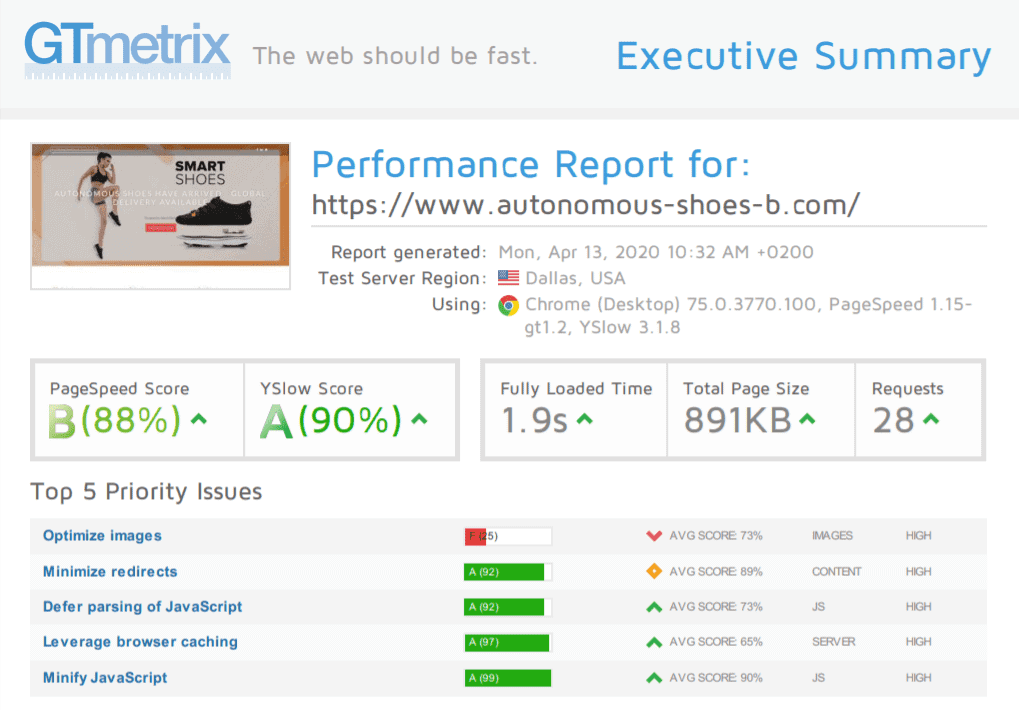 On the other hand, GreenGeeks’ results were much better. Its fastest fully loaded time was 0.8 seconds, the slowest was 2.4, and the average was 1.7. You can see the full results of our testing in our in-depth GreenGeeks review.
On the other hand, GreenGeeks’ results were much better. Its fastest fully loaded time was 0.8 seconds, the slowest was 2.4, and the average was 1.7. You can see the full results of our testing in our in-depth GreenGeeks review.
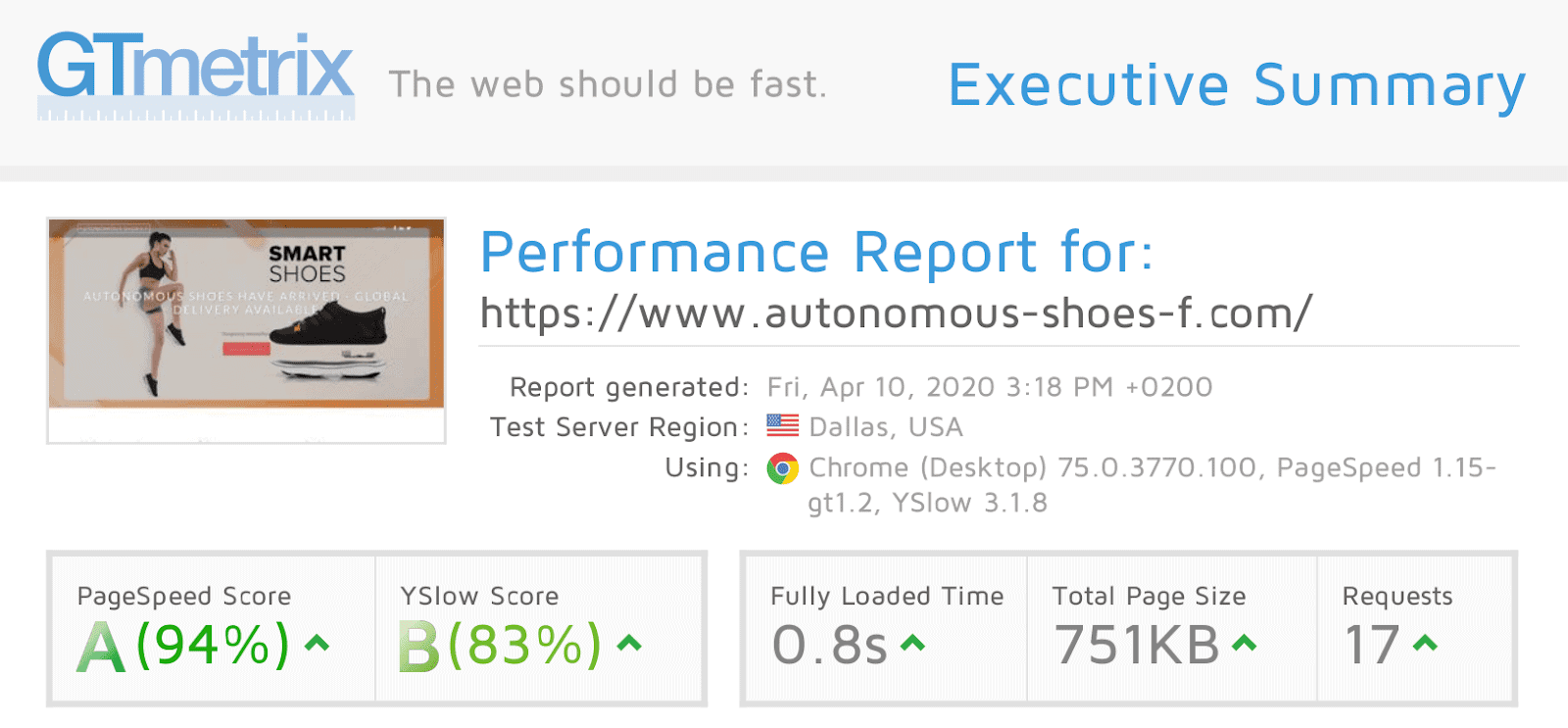
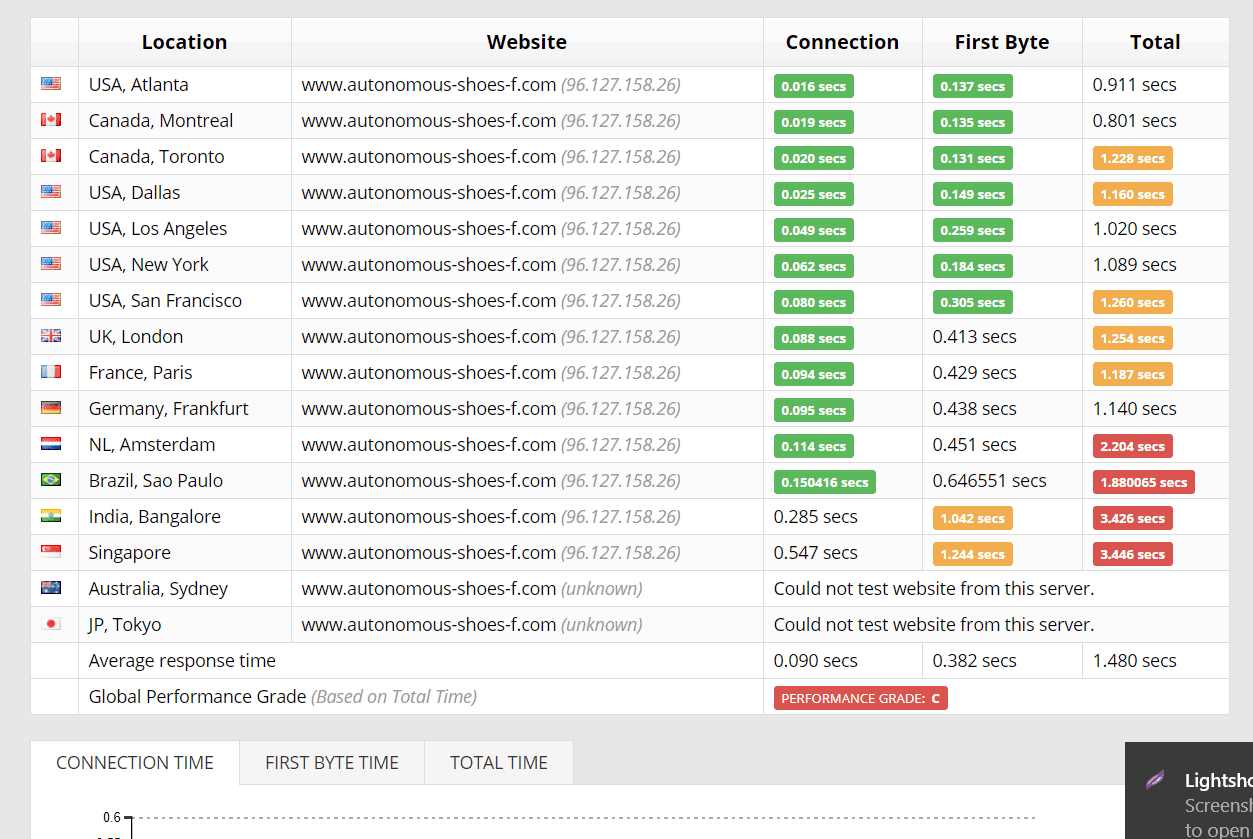
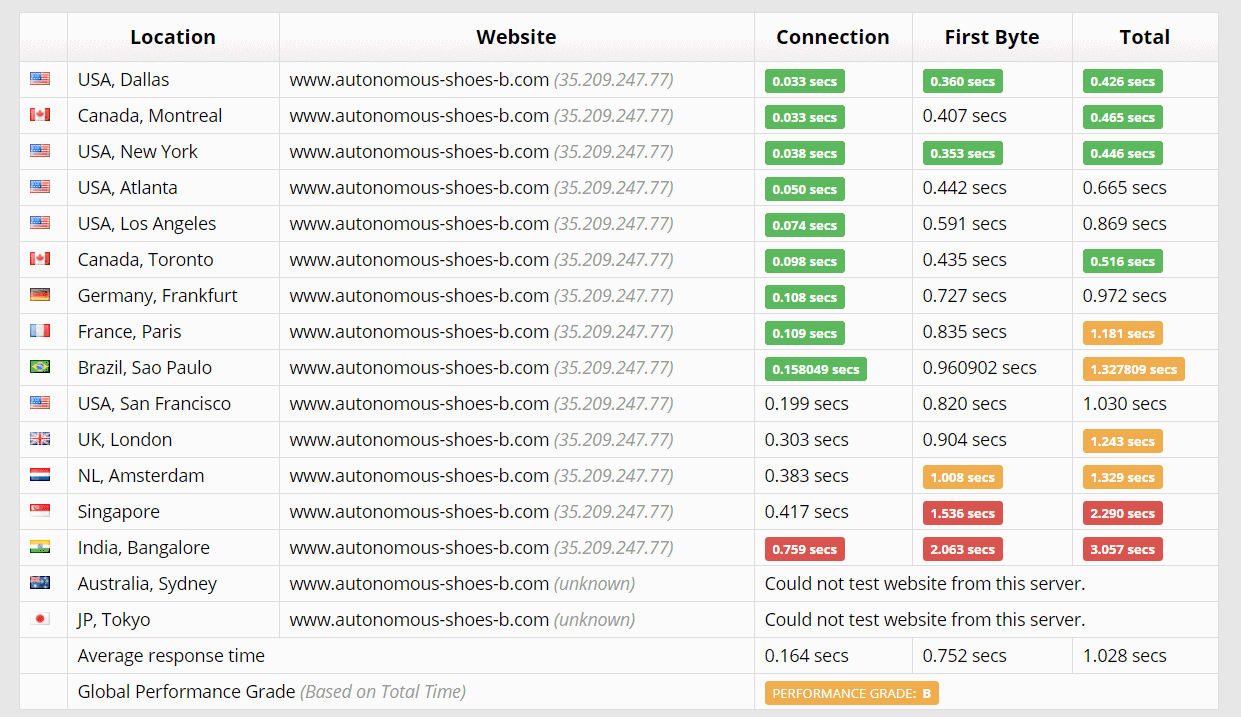
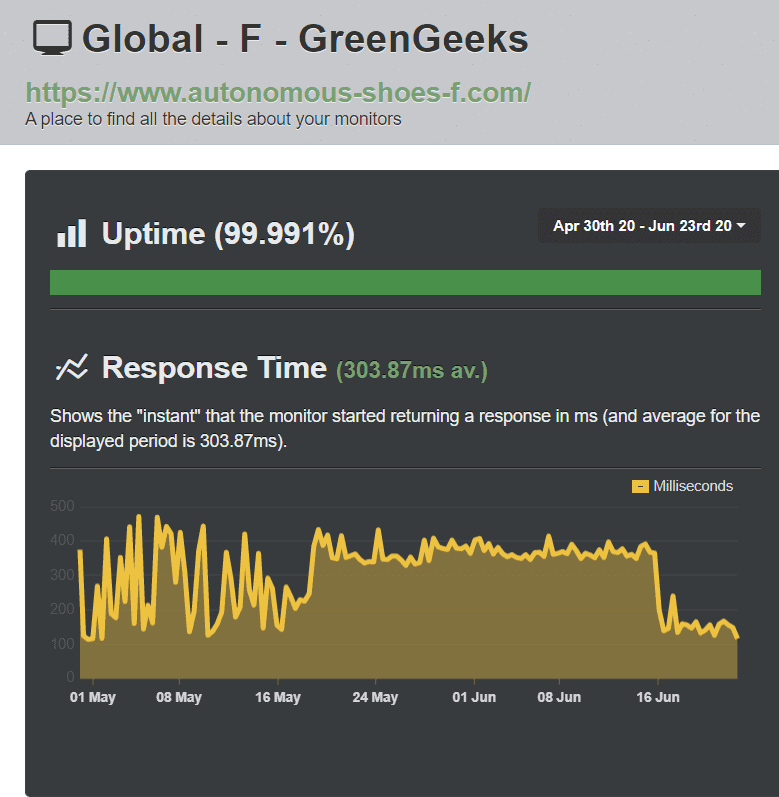
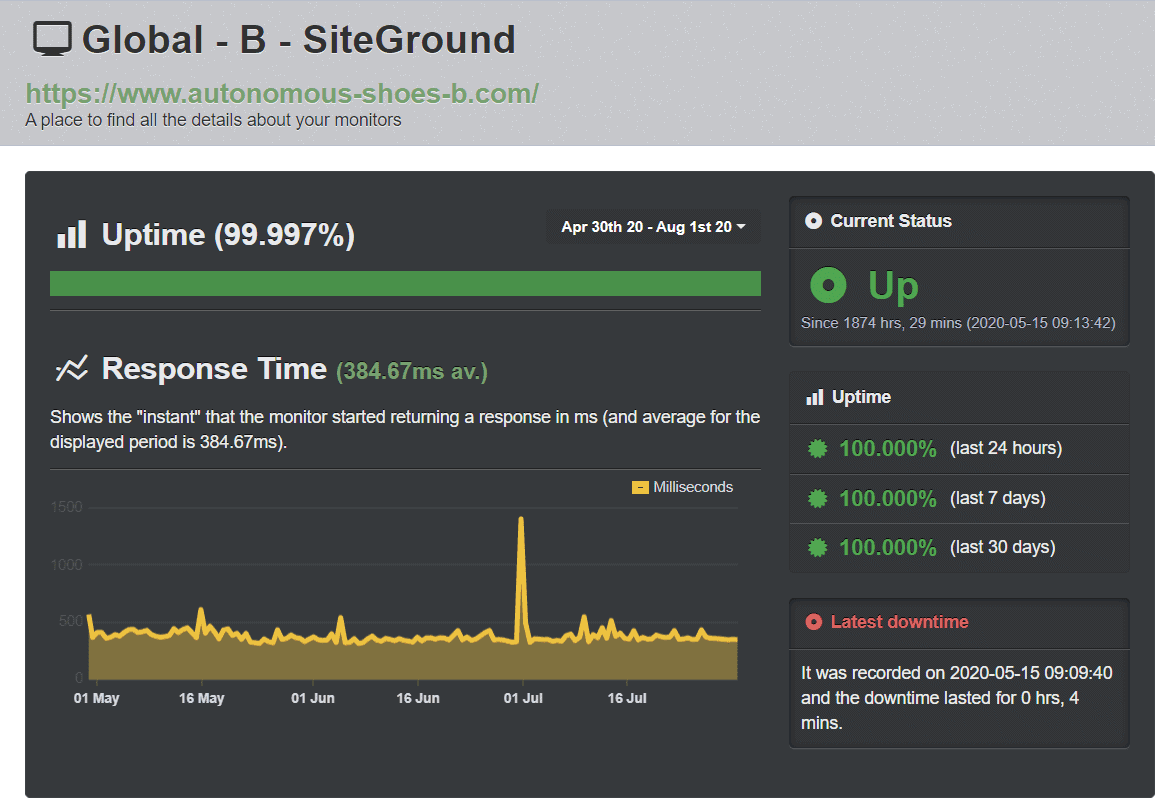
4. Security
GreenGeeks Is Secure, but SiteGround Has a Slight Edge
Both SiteGround and GreenGeeks have great baseline security. Both give you a free SSL certificate from Let’s Encrypt, regardless of the plan you choose. In addition, customer accounts are isolated from one another using container-based technology, which means that your website won’t be affected if one of your server neighbors falls prey to malware. GreenGeeks and SiteGround proactively monitor their infrastructure and run real-time security scans on top of that. This is a great defense against DDoS attacks, which can render a cluster of servers unusable for many days on end. The list doesn’t end there. Both web hosts give you spam protection for your emails, as well as proactive updates and patches for critical software like WordPress. The two hosts also run daily backups that you can rely on in case of a hardware failure. SiteGround has a slight edge with its proprietary web application firewall (WAF), which has a good reputation for protecting against known vulnerabilities in applications like Drupal, Joomla, and WordPress.5. Support
SiteGround Has Decent Support, but GreenGeeks’ Is Excellent
Support is where GreenGeeks really shines. Let’s take a closer look. Both SiteGround and GreenGeeks offer 24/7 support through live chat, phone, and tickets. That said, SiteGround’s support can be difficult to reach at times. First you have to fill out an annoying contact form, and the average waiting time (after I initiated a chat) was around 30 minutes. However, when I finally got in touch with a SiteGround agent, they were helpful, polite, and professional. I had trouble with an SSL certificate and the agent offered to install it for me. That kind of made the wait worthwhile.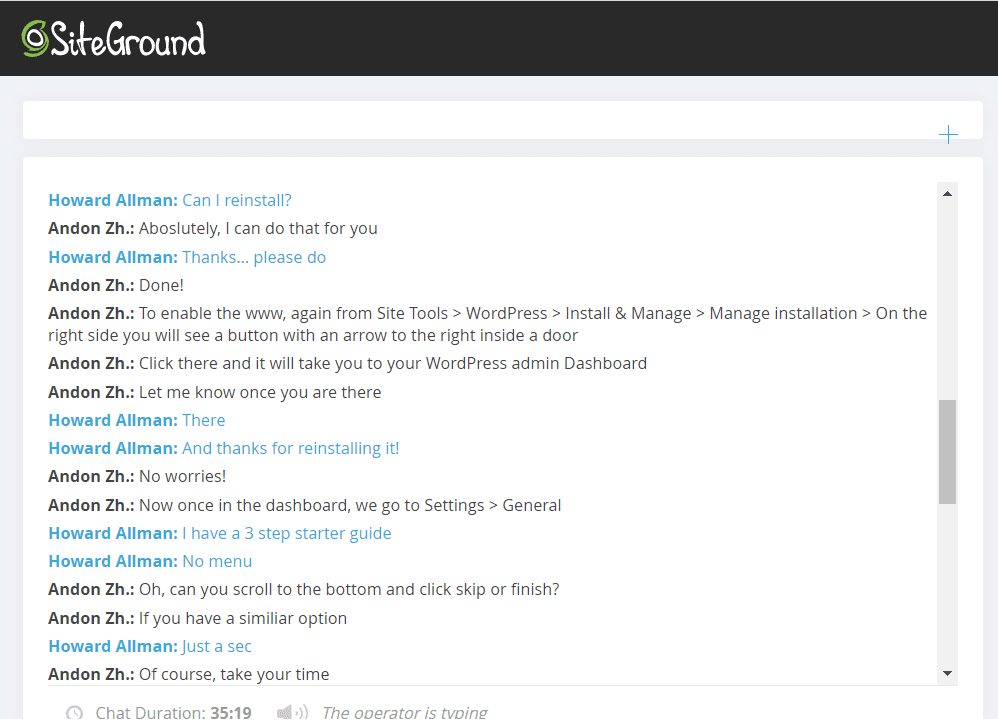
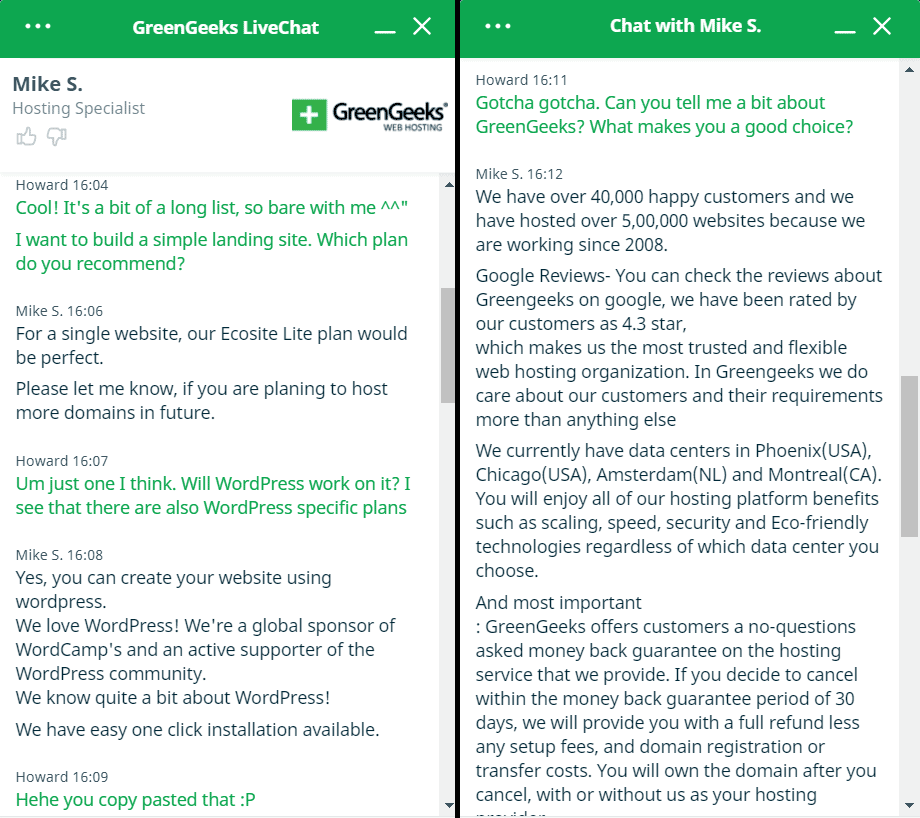
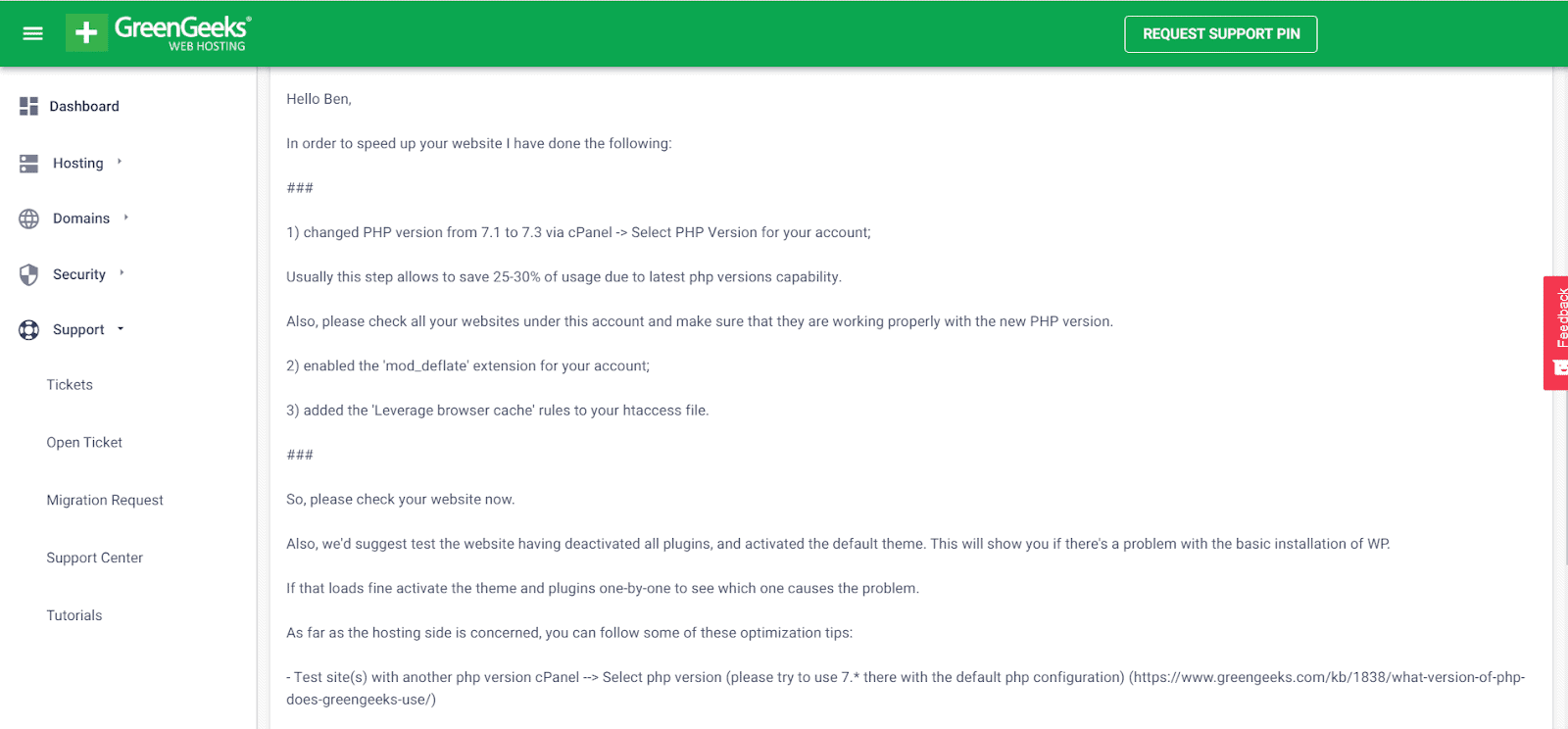
SiteGround Is Good, but GreenGeeks Is Better
With its eco-friendly hosting, better prices, and excellent support, GreenGeeks is the clear winner of this comparison. If you just want a simple site and you’re not that tech savvy, GreenGeeks’ beginner-friendly hosting plans and above-and-beyond approach to support will spare you a lot of hassle. This doesn’t mean that SiteGround is bad – far from it. The two hosts are fairly matched in terms of features, and SiteGround’s hosting plans do come with slightly better security. Although slower than GreenGeeks, SiteGround has a lot in store for developers and those who want a solid cloud solution. After all, both hosts made it to our list of the best web hosting services, so you can’t go horribly wrong with either. Here are the main takeaways from my SiteGround vs GreenGeeks comparison:SiteGround
GreenGeeks
Plans and Pricing
More expensive than GreenGeeks, premium plans have good value
Better prices than SiteGround, excellent value on all plans
Features
Unlimited websites and bandwidth on most plans, streamlined proprietary control panel, ship-to-client features, automatic updates for popular software, 100% green hosting
Unlimited websites, storage space, and bandwidth on most plans; free domain name with one year of hosting; cPanel; automatic WordPress updates; 300% green hosting
Performance
SSD storage, Apache web server with NGINX, Cloudflare CDN with Railgun, six data center locations, average performance, great uptime
SSD storage, LiteSpeed web server, Cloudflare CDN, four data center locations, great performance and uptime
Security
DDoS protection, free SSL, free automatic backups and app updates, real-time monitoring, custom WAF
DDoS protection, free SSL, free automatic backups and WP updates, real-time monitoring
Support
24/7 support via live chat, tickets, and phone; great knowledge base
24/7 support via live chat, tickets, and phone; extensive knowledge base








![8 Best Enterprise WordPress Hosting (Scalable & Reliable) [2025]](https://dt2sdf0db8zob.cloudfront.net/wp-content/uploads/2024/11/Best-Enterprise-WordPress-Hosting-1.png)
![8 Best Enterprise WordPress Hosting (Scalable & Reliable) [2025]](https://dt2sdf0db8zob.cloudfront.net/wp-content/uploads/2023/05/Caitlin-Greyling-150x150.jpg)






